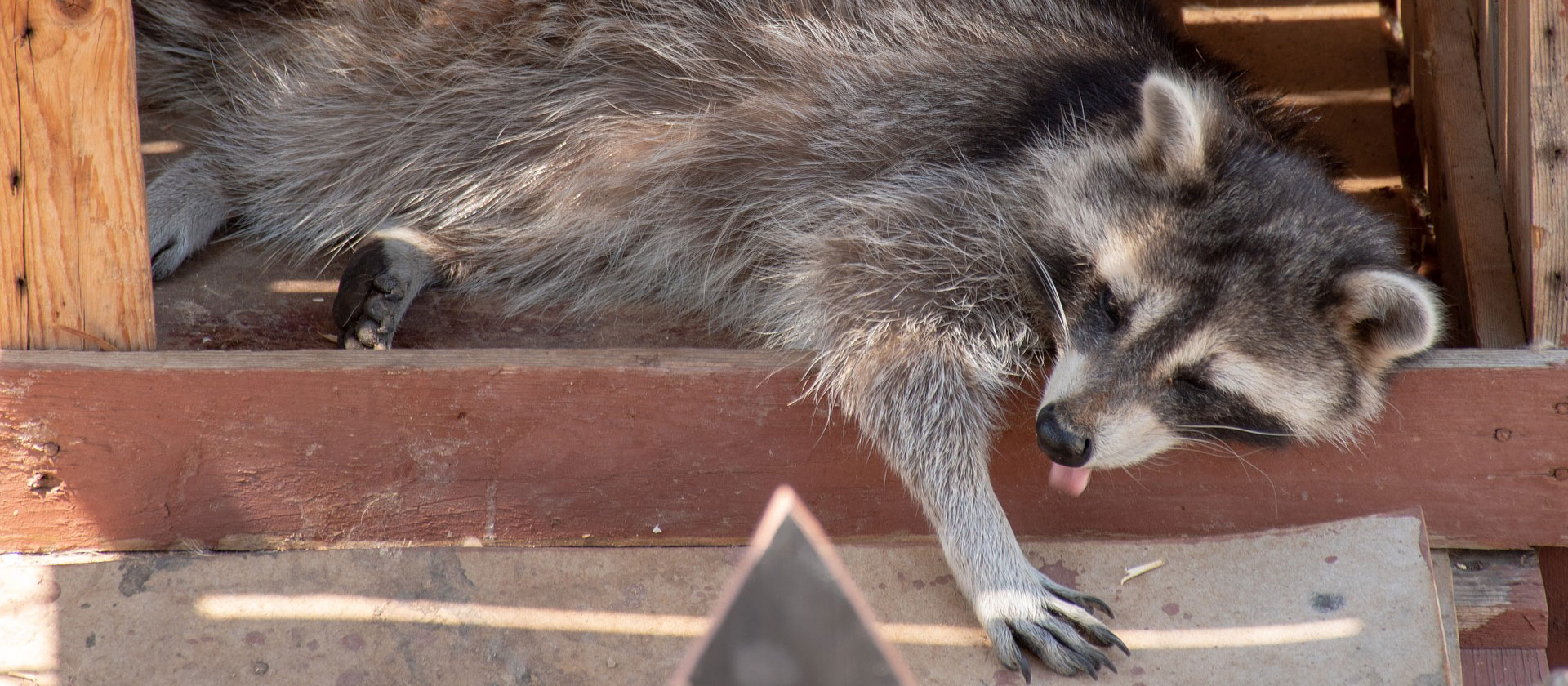It depends - on what type of animal, what type of damage, and your homeowner's policy. When a wild animal damages a structure on your property, your homeowners insurance may provide some coverage under its Dwelling or Other Structures protection. However, the majority of policies will not.

Read This Before Filing a Claim:
It's important to review your policy's deductible, which is the amount you pay before your insurance benefits kick in. You may also want to confirm your coverage limit, which is the maximum amount of coverage your policy provides, so that you understand how much protection you have in place and if it's worth filing a claim.
Does Homeowners Insurance Cover Raccoon Damage?
Structural damage to your home 'may' be covered, although many policies will either classify raccoons as 'pest animals' (and therefore not covered) or exclude them explicitly or in a 'vermin' or 'rodent' clause. Let's assume that your policy does not exclude pest wildlife or raccoons in particular and a raccoon decides to rip open your roof to get into your attic; damage repair to your roof may be covered. Damage to your personal property in the attic would likely not be covered.
Does Homeowners Insurance Cover Raccoon Removal and Damage Replacement?
That's a hard NO on removal. Even if your homeowners insurance policy covers raccoon damage, you're on your own when it comes to evict the little squatters. Call a qualified Wildlife Removal Service to facilitate the removal and likely latrine cleanup and disinfection.
Understanding Homeowners Insurance Policies
As with any legal document, take your time to read and understand your Homeowners Insurance policy. Make notes on terms you don't understand and ask questions,
Common Inclusions and Exclusions
Most Homeowners policies have a vermin exclusion clause. If so, they should list the animals that fall into that category. If 'raccoon' is not listed, you may be able to still file a claim. Since insurance companies aren't necessarily fond of paying for your damages, they may argue that the damage caused was preventable - that where the raccoon got into your home was in disrepair and the damage was caused by owner neglect.
Types of Damage Typically Covered
If nothing in your policy excludes raccoons and/or the damage they cause, your Dwelling and/or Other Structures coverage may come into play. Covered damages would refer to the structure itself, but not to any of your personal belongings. And again, the larger the animal, the better your chance to get at least some reimbursement. Example: A deer runs into your patio door — this damage may be covered by your dwelling protection. The Other Structures coverage in your insurance policy helps protect structures on your property that aren't connected to your home, such as a fence, outbuildings or detached garage. So, if that deer damages part of your fence, the other structures coverage in a homeowners insurance policy may help with the costs of resulting repairs. The larger the animal that caused damage, the more likely your claim is to be successful.
Raccoon Damage Scenarios
Structural Damage
Damage to walls - both exterior and interior - as well as roof, chimney and sometimes interior floors may be covered.
Electrical Issues and Risks
Raccoons in attics can cause a host of issues... chewed wiring is just one of them. As with all things electrical, it is of utmost importance that you locate and repair the damage at once. Or else you may end up with a fire - and that damage will far surpass anything a raccoon could do.
Contamination Concerns
Attics are one of the top contenders for raccoon winter hideouts - also a great place to raise a family! If you happen to host a coon or five in your attic, you will also have to contend with their latrine. Cleanup and disinfection should be done by a professional wildlife company. You are dealing with hazardous materials that need to be disposed of properly. Expect having to replace some drywall or wood where urine has soaked through.
Filing an Insurance Claim for Raccoon Damage
First off, call your insurance agent. Explain your situation and find out what - if anything - is covered under your homeowners policy. He/she can also help with filing a claim once you have determined that the damage falls under insurable losses.
Documentation Needed
Keep a journal of where and when you saw or heard a raccoon, provide pictures if possible. Also take photos of the access point (roof, vents, chimney, etc.) and any damage there.
Steps to Take After Discovery
Call your insurance agent. Take pictures if possible, then contact a Professional Raccoon Removal Service, such as Hawkeye Bird & Animal Control to remove the animal(s) from your property and help with necessary repairs or exclusion methods so that you won't find yourself 'with raccoon' any time soon again.
Tips for a Successful Claim Process
Communicating with Your Insurer
Dig out your homeowners insurance policy (chances are it's been years since you actually looked at it) and call your Insurance Company or an agent you work with. You will be guided from there.
Knowing Your Rights as a Homeowner
Carefully read your insurance documents; it will contain both your rights and responsibilities. Do some research online (forums are a great way to get feedback from other homeowners).
Frequently Asked Questions
Does State Farm Homeowners Insurance Cover Raccoon Damage?
They do not. But if the raccoon damage leads to an insured loss (like a fire), you should be covered.
Does Allstate Homeowners Insurance Cover Raccoon Damage?
Depending on YOUR policy, an Allstate standard homeowners insurance policy may help cover repairs if a raccoon damages or destroys your roof, vents, attic, or other areas of your home's structure. However, homeowners are typically responsible for repairing or replacing personal items such as clothing, electronics and furniture that sustained raccoon damage.
Does Desjardins Homeowners Insurance Cover Raccoon Damage?
No, Raccoons are explicitly excluded. However, if raccoons tore a hole in your roof and you now have water damage - the water damage would be covered. If raccoons chewed your wires and you ended up with a fire... same thing - the fire damage would be covered.














